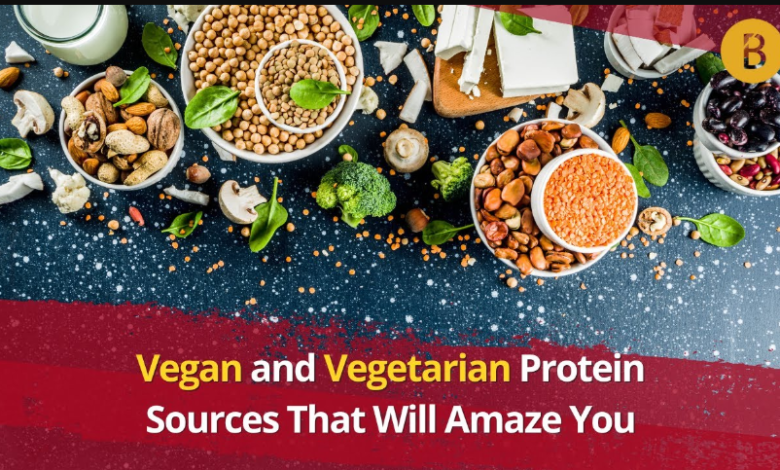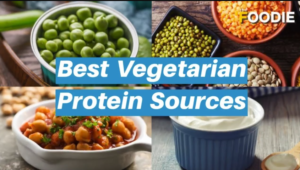Wellhealthorganic.Com:Vegetarian Protein Sources: Top Picks!

Lentils, chickpeas, quinoa, and almonds are top vegetarian protein sources. These foods offer ample protein for those on a plant-based diet.
Adopting a vegetarian lifestyle necessitates finding reliable protein sources to maintain overall health and muscle function. Protein is fundamental for body repair, immune system functionality, and maintaining energy levels. Vegetarian diets can provide adequate protein through a variety of plant-based foods.
Vegetarians must include protein-rich foods in every meal to meet their nutritional needs. Some of the best options are whole grains, nuts, seeds, legumes, and soy products, which are high in protein and offer additional health benefits such as fibre, vitamins, and minerals. With a well-planned diet, vegetarians can quickly achieve their protein requirements while enjoying diverse and delicious meals. Integrating these vegetarian protein sources into your diet can promote a healthy and balanced lifestyle.
Contents
- 1 The Rise Of Plant-based Diets
- 2 Protein Essentials For Vegetarians
- 3 Legumes: Powerhouses Of Protein
- 4 Nuts And Seeds: Nutrient-dense Snacks
- 5 Whole Grains: More Than Just Fiber
- 6 Soy Products: Versatile Protein Sources
- 7 Dairy Alternatives Rich In Protein
- 8 Protein-rich Vegetables
- 9 Superfood Smoothies And Shakes
- 10 Combining Sources For Complete Proteins
- 11 Myths About Plant Protein Busted
- 12 Case Studies: Successful Vegetarian Athletes
- 13 Faqs For Vegetarian Protein
- 14 Getting Started With A Vegetarian Protein Diet
- 15 Conclusion
The Rise Of Plant-based Diets

The interest in plant-based diets has soared. More people now explore vegetarian protein sources than ever before. This change stems from various reasons, including health, ethics, and environmental concerns. As a result, supermarkets, restaurants, and food companies respond with various plant-based options.
Shifting Dietary Preferences
Changing what we eat often starts with reconsidering protein sources. Legumes, nuts, seeds, and whole grains are excellent protein-rich alternatives to meat, and people are redefining meals around these vegetarian options.
- Lentils and chickpeas take centre stage in stews and salads.
- Quinoa and brown rice provide a protein boost to any dish.
- Tofu and tempeh have emerged as versatile meat substitutes.
- Almonds and chia seeds add a nutritious crunch to breakfasts.
Health And Environmental Benefits
Selecting plant-based proteins isn’t just good for our bodies—it’s also kinder to the planet. Vegetarian diets have been linked to lower risks of heart disease, diabetes, and obesity. Plus, they require less water and land and generate fewer greenhouse gases.
| Health Benefit | Environmental Impact |
| Improved heart health | Lower carbon footprint |
| Reduced risk of diabetes | Less water usage |
| Weight management | Reduced deforestation |
Protein Essentials For Vegetarians
Getting enough protein can be challenging if you’re a vegetarian. This belief is not valid. With some planning, vegetarians can meet their protein needs. Let’s explore protein essentials for every vegetarian’s diet.
Why Protein Is Vital
Proteins are your body’s building blocks. They help build muscles and repair tissues. They are also crucial for a healthy immune system. Your body uses protein to make hormones and enzymes. A protein-rich diet keeps you full longer, helping you manage weight.
Without enough protein, your body can’t function properly. That’s why vegetarians must choose their foods wisely to get enough of them.
Recommended Protein Intakes
The amount of protein each person needs can vary depending on age, gender, and activity level. Eating diverse protein sources throughout the day ensures that you get all essential amino acids.
| Age | Daily Protein Need |
| Adult Males | 56 grams |
| Adult Females | 46 grams |
| Pregnant/Breastfeeding Females | 71 grams |
Vegetarians can choose from a variety of foods to get protein. Lentils, beans, quinoa, tofu, and nuts are great options. It’s essential to eat these foods in sufficient quantities every day. Always pay attention to serving sizes. This ensures you’re getting enough protein.
Use these protein-rich foods as meal foundations. Build around them with vegetables, grains, and fruits for balanced nutrition. Each meal should combine different protein sources, giving your body the complete amino acid profile it needs.
Plant-based proteins can provide all the nutrients needed. They maintain health without meat. For optimal health, include a variety of these foods in your diet.
Legumes: Powerhouses Of Protein
Legumes are a staple in vegetarian diets. Packed with protein, they offer a rich source of nutrients for those avoiding meat. This essential food group includes a variety of options. Legumes are versatile and nutritious, from lentils to beans and chickpeas to peas. Their high protein content supports muscle development and overall health.
Lentils And Beans
Lentils and beans are true nutritional champions. With distinct flavours and textures, they form the base of countless dishes. High in protein, they also provide vital vitamins and minerals. Listed below are some top choices:
- Green Lentils: Ideal for stews and salads
- Black Beans: Great in soups and burritos
- Red Kidney Beans: Perfect for chillies and curry
When cooked right, lentils and beans can be as tempting as they are nutritious.
Chickpeas And Peas
Chickpeas and peas are often the stars of veggie-friendly meals. They pack a hefty protein punch and are rich in fibre.
| Legume | Protein (per 100g) |
| Chickpeas | 19g |
| Green Peas | 5g |
Blend chickpeas for homemade hummus, or toss peas into a stir-fry. Each of these legumes delivers quality protein to your plate.
Nuts And Seeds: Nutrient-dense Snacks
Nuts and seeds pack a powerful punch of proteins and nutrients. These tiny titans are the perfect vegetarian snacks. They offer essential vitamins, minerals, and fibres that are key to a balanced diet. Grab a handful for a midday snack, or sprinkle them over your favourite dish. Let’s dive into some of the best varieties out there.
Almonds And Pistachios
Almonds boast high levels of vitamin E and magnesium. They are fabulous for heart health. A small handful of almonds is enough for a snack. On the flip side, pistachios are fun to crack open and enjoy. They are rich in protein, fibre, and heart-healthy fats.
- Almonds: roughly 6 grams of protein per ounce
- Pistachios: about 5.72 grams of protein per ounce
Chia Seeds And Flaxseeds
Chia seeds are tiny yet mighty. When soaked, they swell up and become gel-like. Chia seeds can be added to smoothies, yoghurts, and puddings. Flaxseeds have omega-3 fatty acids, which are great for the brain. It’s best to grind flaxseeds before eating to get the most nutrients.
| Seed | Protein (per 2 tablespoons) | Key Nutrients |
| Chia Seeds | 4g | Fibre, Calcium, Antioxidants |
| Flaxseeds | 3.8g | Omega-3 Fatty Acids, Lignans |
Whole Grains: More Than Just Fiber
Whole grains are a powerhouse of nutrition. Often praised for their high fibre content, they also serve as fantastic vegetarian protein sources. Let’s explore how incorporating whole grains like quinoa and oats into your diet can add variety and essential nutrients.
Quinoa And Amaranth
Often mistaken as cereals, quinoa and amaranth are pseudo-grains. They’re loaded with protein and are complete sources containing all nine essential amino acids. These grains are also gluten-free, making them an excellent choice for those with dietary restrictions.
- Quinoa: 8 grams of protein per cup (cooked)
- Amaranth: 7 grams of protein per cup (cooked)
Whole Wheat And Oats
Whole wheat may be familiar, but its protein content is often overlooked. A slice of whole wheat bread offers a good protein boost. Oats are even more interesting – they have a higher protein content than most grains and are also full of fibre, aiding digestion.
| Grain | Protein Per Cup |
| Whole Wheat Bread (1 slice) | 3 grams |
| Oats | 6 grams |
Soy Products: Versatile Protein Sources
Embracing a vegetarian lifestyle brings a quest for protein-rich foods. Soy products stand out as versatile, plant-based protein powerhouses. Packed with all the essential amino acids, soy products offer various health benefits. They fit easily into numerous meals. This section dives into the popular soy-based vegetarian protein sources.
Tofu And Tempeh
Tofu, also known as bean curd, offers a smooth texture and the unique ability to absorb flavours. Tempeh bears a nuttier taste and boasts a higher content of fibre and vitamins. Both are brilliant for heart health. Below is a quick comparison:
| Feature | Tofu | Tempeh |
| Protein content per 100g | 8g | 19g |
| Fiber content per 100g | 1g | 9g |
| Texture | Smooth | Grainy |
- Tofu: Ideal for stir-fries, scrambles, and soups
- Tempeh: Great in sandwiches, salads, and grilled dishes
Edamame And Soy Milk
Young soybeans and edamame are a delicious snack or side dish. They bring a great hit of protein and fibre. Soy milk, extracted from soybeans, is a popular dairy alternative. It’s enriched with vitamins and minerals. Note their nutritional value:
- Edamame: A cup serves 17g of protein and 8g of fibre.
- Soy Milk: A cup grants 7g of protein and 1g of fibre.
Edamame shines in salads, pasta, or just steamed with a pinch of salt. Soy milk complements coffee and cereals or is enjoyed as a beverage. Give these easy protein fixes a spot in your diet!
Dairy Alternatives Rich In Protein
Finding protein sources is a priority for those embracing a vegetarian lifestyle. Dairy products traditionally supply protein, but not everyone can enjoy them. Fortunately, dairy-free alternatives are rising, supplying plant-based protein to meet nutritional needs. These options are perfect for vegetarians, vegans, and those with lactose intolerance.
Almond And Soy Yogurts
Almond and soy yoghurts stand out in the dairy-free aisle. They are creamy, delicious, and packed with protein. Here’s why they are an excellent choice:
- Almond yoghurt – High in protein, low in calories, and rich in good fats.
- Soy yoghurt – Offers a protein punch similar to dairy yoghurt. Great for muscles.
Nut-based Cheeses
Nut-based cheeses are another fantastic dairy alternative. They are made from nuts like almonds, cashews, and macadamias. Check out their benefits:
| Nut Cheese Type | Protein Content |
| Almond Cheese | Good protein levels, plus vitamins and minerals. |
| Cashew Cheese | Rich in protein and heart-healthy fats. |
| Macadamia Cheese | Offers protein and a creamy texture. |
Embracing these plant-based proteins can lead to a balanced, satisfying vegetarian diet.
Protein-rich Vegetables
Knowing where to find protein is crucial when embracing a vegetarian lifestyle. Unlike meat, plants can pack a punch with protein, too. Let’s explore the world of protein-rich vegetables perfect for any vegetarian meal.
Broccoli And Spinach
Broccoli isn’t just about Vitamin C; it’s a protein powerhouse. A single cup of chopped broccoli offers about 2.6 grams of protein. Eat it steamed or stir-fried to get the most out of this green gem.
Spinach, the leafy green superhero, boasts about 5.3 grams of protein per cup when cooked. Spinach salads or smoothies are perfect to boost your protein intake.
Sweet Corn And Kale
Sweet corn offers both taste and protein. A cup of yellow corn kernels contains approximately 4.7 grams of protein. Pair it with beans or toss it into salads for a tasty meal.
When raw, kale on the leafier side has about 2.9 grams per cup. It’s versatile, so you can make kale chips or blend them into a protein shake.
| Vegetable | Protein (per cup) |
| Broccoli | 2.6 grams |
| Spinach | 5.3 grams |
| Sweet Corn | 4.7 grams |
| Kale | 2.9 grams |
- Broccoli can be part of the main dishes or sides.
- Spinach works well, fresh or cooked.
- Sweet corn is versatile, from grilled to salads.
- Kale can be eaten raw or cooked in various ways.
Superfood Smoothies And Shakes
Embarking on a vegetarian lifestyle can pose challenges to meeting protein needs. Fear not! Superfood Smoothies and Shakes offer delightful ways to boost your protein intake. Crafted from nature’s finest, these beverages are nourishing and incredibly satisfying. Dive into the world of smooth, creamy goodness, where protein meets the irresistible flavours of superfoods!
Incorporating Protein Powders
Smoothies and shakes are perfect for adding a protein punch to your diet. A scoop of plant-based protein powder transforms your drink into a powerful daily fuel. You can choose powders from peas, brown rice, or hemp seeds. These powders blend seamlessly into your drinks without altering the taste too much. With every sip, you get essential amino acids vital for muscle repair and growth.
Recipes For Everyday
Let’s mix some magic with daily recipes that pack nutrients and taste. Kickstart your day with a chocolate banana shake, or refresh after a workout with a Berry Blast smoothie. Below are recipes that will become staples in your daily routine.
- Chocolate Banana Protein Shake: Blend a ripe banana, a cup of almond milk, one scoop of chocolate protein powder, and a handful of ice cubes.
- Berry Blast Smoothie: Mix a cup of mixed berries, a scoop of vanilla protein powder, oat milk, and a drizzle of agave syrup.
- Tropical Green Energy: Combine a scoop of plain protein powder with coconut water, half a cup of mango chunks, and a handful of spinach.
| Smoothie | Protein (g) | Calories |
| Chocolate Banana Shake | 20 | 300 |
| Berry Blast Smoothie | 18 | 250 |
| Tropical Green Energy | 15 | 220 |
Each recipe ensures your body gets what it needs to stay strong and energized. Blend your way to a healthier you with these protein-packed superfood smoothies and shakes!
Combining Sources For Complete Proteins
Vegetarians often wonder how to get all the essential amino acids from a plant-based diet. Proteins comprise amino acids; not all plant-based proteins contain all the essential amino acids your body needs. Combining different vegetarian protein sources is critical. This method ensures you consume all the necessary building blocks for a healthy body.
Complementary Proteins
Complementary proteins are two or more vegetarian protein sources that provide all nine essential amino acids. Not all plant sources have these essential acids on their own. But your body gets what it needs when you eat different ones together. For example, combine beans and rice to create a meal high in complete proteins. Here’s a list of pairs that work well together:
- Legumes with Grains: Beans with rice, chickpeas with couscous
- Nuts or Seeds with Legumes: Peanut butter on whole-grain bread, lentil salad with almonds
- Grains with Dairy: Cheese with whole-grain crackers, yoghurt with granola
Meal Planning Tips
Ensuring you’re getting all the amino acids you need doesn’t have to be complicated. Here are some meal-planning tips to help you combine proteins easily:
| Meal Time | Complementary Protein Combos |
| Breakfast | Oatmeal with chopped nuts and soy milk |
| Lunch | Quinoa salad with black beans and avocado |
| Dinner | Stir-fried vegetables with tofu and brown rice |
| Snacks | Hummus with whole-grain pita |
Remember to vary your protein sources throughout the week. This ensures that you get a variety of nutrients from different foods. Also, planning meals makes you more likely to maintain a balanced diet.
Myths About Plant Protein Busted
Protein is often a hot topic in vegetarian diets. Many people think that plant proteins don’t measure up to animal-based options. This part of the blog busts those myths and sheds light on the truth about plant protein sources.
Debunking Incomplete Protein Myths
Myth: All plant proteins are incomplete. Truth: Many plants offer complete proteins. Quinoa and buckwheat are such superstars. They contain all nine essential amino acids. Other plants can be combined to create complete proteins. Think rice and beans or hummus and pita. These combinations are delicious and complete in protein content.
- Complete Proteins: Soy, quinoa, and chia.
- Pair for Power: Legumes with grains or nuts and seeds.
Quantity Vs. Quality
It’s not all about how much protein you eat—the quality matters. A wide range of plant-based foods ensures you get all the necessary amino acids. Plus, they come with fibre, vitamins, and minerals. There’s no need to worry about high cholesterol levels often associated with some animal proteins.
| Food | Protein | Additional Benefits |
| Lentils | 18g per cup | Iron and fibre |
| Almonds | 7g per ¼ cup | Healthy fats and vitamin E |
| Tofu | 20g per cup | Calcium and iron |
Remember, a multifaceted vegetarian diet is vital for getting the quantity and quality of protein you need. Aim for a variety of plant-based protein sources every day. Your body will thank you for the healthy boost!
Case Studies: Successful Vegetarian Athletes
Case Studies: Successful Vegetarian Athletes reveal that achieving peak performance isn’t limited to carnivorous diets. A variety of high-profile sports icons thrive on plant-based protein sources. This article delves into the lives of these athletes, unravelling the mystery behind their robust health and stellar performance.
Nutritional Strategies
Top athletes master the art of balancing nutrients while abstaining from meat. They focus on consuming various legumes, grains, and leafy greens. These foods offer ample protein, which is critical for muscle repair and growth.
- Lentils, chickpeas, and tofu are regular staples.
- Quinoa and amaranth provide quality protein and essential amino acids.
- Almonds and chia seeds are excellent for omega-3 fatty acids.
- Vegetables like broccoli and spinach are packed with iron and calcium.
Training On A Vegetarian Diet
Training regimens for vegetarian athletes are similar to those of their meat-eating counterparts. The key lies in careful planning and mindful eating.
| Stage of Training | Diet Focus |
| Off-Season | Building a nutritional foundation with whole foods. |
| Pre-Season | Increasing caloric intake to support intensified workouts. |
| Competitive Season | Tailoring diet for optimal performance and recovery. |
Vegetarian athletes often supplement with vitamin B12, D, and omega-3s to ensure no shortfall in essential nutrients.
Faqs For Vegetarian Protein
When switching to a vegetarian diet, protein sources become a hot topic. This section aims to answer the most common questions about vegetarian protein sources. Understanding these sources ensures a balanced and nutritious diet while enjoying the many flavours of plant-based foods.
Addressing Common Concerns
Many people need more protein from vegetarian sources. Let’s tackle these worries with precise information.
- Will I get enough protein? Yes, numerous plant-based foods are rich in protein.
- Can vegetarian protein be complete? Combining different plant proteins can provide all essential amino acids.
- Is plant protein as good as animal protein? Both are beneficial; plant protein also offers fibre and less saturated fat.
Expert Answers
Professionals in nutrition often get asked about vegetarian proteins. Here are their insights.
- What are the best vegetarian protein sources? Legumes, nuts, seeds, whole grains, and soy products top the list.
- How can I add more protein to my vegetarian meals? Include a variety of protein-rich foods in every meal, like beans in salads or tofu in stir-fries.
- Do I need to track my protein intake? Most people meet their protein needs by eating a varied diet. However, if you have specific dietary goals, consider tracking.
Getting Started With A Vegetarian Protein Diet
Embarking on a vegetarian protein diet can be a rewarding journey. It opens up a world of diverse and nutritious foods. High-protein vegetarian diets support muscle health and overall well-being. When well-planned, they can meet all dietary needs. Here’s how to start with simple steps and delicious recipes.
Shopping List Essentials
Starting a vegetarian protein diet begins with a smartly stocked pantry. Here’s what to include:
- Legumes: Chickpeas, lentils, and black beans pack a protein punch.
- Nuts and Seeds: Almonds, chia seeds, and flaxseeds are great for snacking and adding to meals.
- Whole Grains: Quinoa and brown rice offer essential amino acids and fibre.
- Dairy or Plant-Based Alternatives: Greek yoghurt and fortified soy milk are excellent protein sources.
- Tofu and Tempeh: These soy products are versatile protein staples.
- Leafy Greens: Spinach and Kale add a nutrient-dense protein boost.
Basic Vegetarian Protein Recipes
Creating mouthwatering meals is easy with these basic vegetarian recipes:
| Recipe | Protein Source | Preparation Time |
| Lentil Soup | Lentils | 30 minutes |
| Chia Pudding | Chia Seeds | 15 minutes + chilling |
| Quinoa Salad | Quinoa | 20 minutes |
| Grilled Tofu Steaks | Tofu | 25 minutes |
These recipes make starting a vegetarian protein diet simple and tasty. Begin with these essentials and explore the endless variations to keep your meals exciting and protein-rich!
Conclusion
Embracing a vegetarian lifestyle enriches your health with powerful proteins from plant sources. WellHealthOrganic. Com’s guide illuminates diverse options, from lentils to quinoa. Your journey to robust health, powered by nature’s bounty, begins with incorporating these nutrient-dense alternatives. Let’s transform wellness, one plant-based meal at a time.



